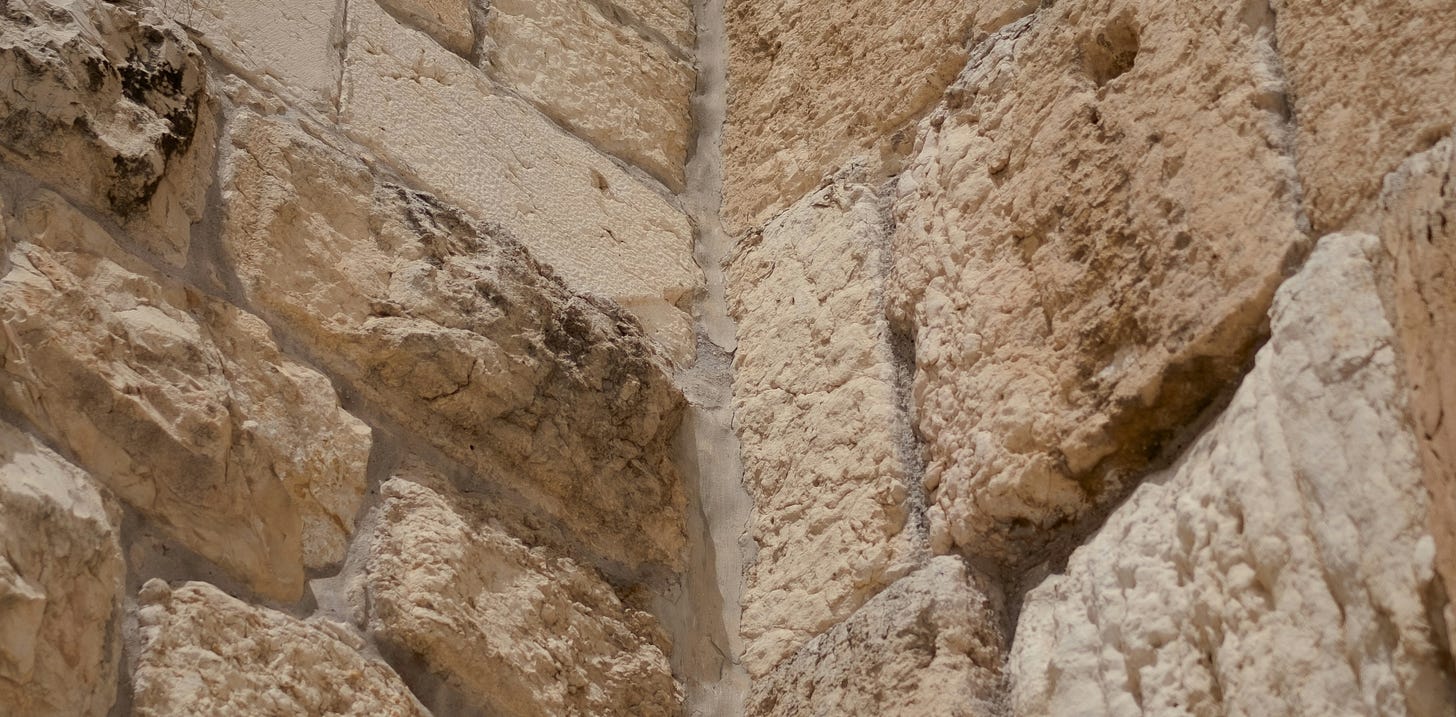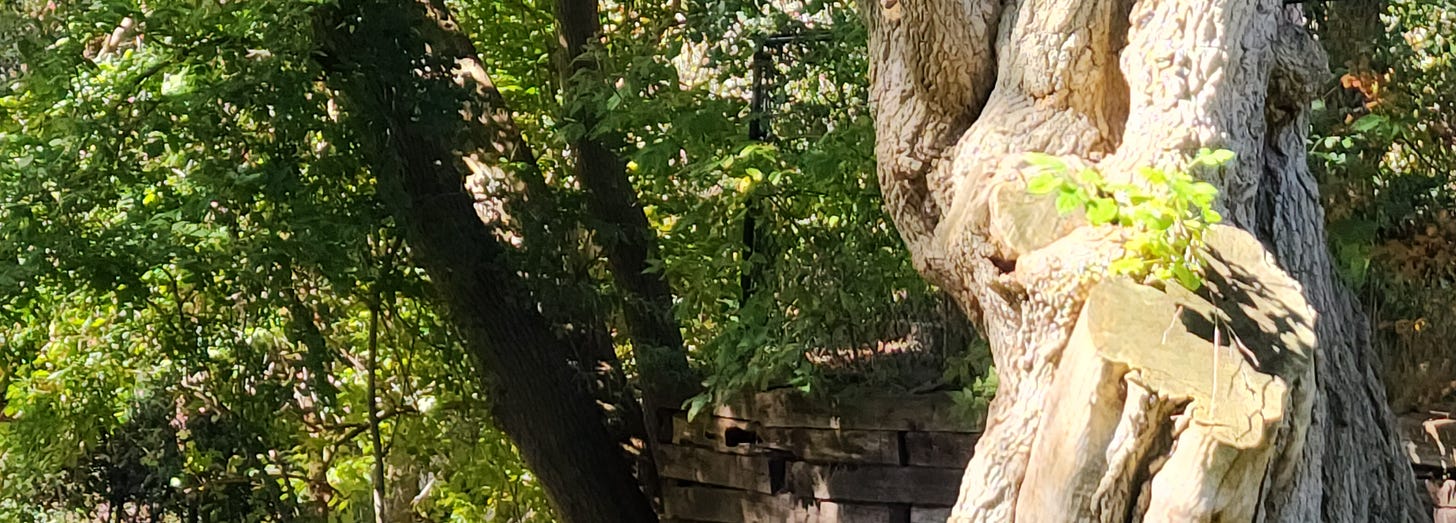These past few days, many of us have marked at least one of two converging traditions: Yom Kippur in Jewish households and communities around the world and Thanksgiving in Canada. The former is a day of atonement, when the world is set aright through the acknowledgement of wrongs. The latter, a gathering of families and friends to celebrate the harvest, something to which few of us remain directly connected.
Laying the meaning and purpose of these days side by side - Yom Kippur and Thanksgiving - exposes an intriguing difference between the traditions. The former, based on a religious failure to remain faithful to the god called Yahweh, calls one to a recognition and acknowledgement of their communal and personal complicities in what the religious might term “evil”. The latter, rooted in the British tradition of giving thanks to the god called God for mercies extended to the innocent who might otherwise have been the victims of “evil”1, is an often gluttonous celebration of unmerited bounty. The difference between the perspectives is dramatic.
Right and wrong
We sometimes get things wonderfully right and we sometimes get them horrifically wrong and often, our stories are too long and arduous to be able to disentangle those two perspectives sufficiently to know which is which. It seems, at this time in our civilization’s evolution, this spinning toward collapse, that we might find a day to step sideways from the norm. Perhaps we can make one up. After all, every one of those we now celebrate was conceived in some person’s or some community’s imagination. I’ll save that thought.
Every remembering of the past and every imagining of the future is illusory. We base the past on what our brains have chosen to remember, the scientific study of which proves memory an inconstant and fickle recording secretary. We imagine our futures based on the stubborn belief that things will continue on as they always have, forgetting that belief is just and only that: belief, the hope that things we want to be true, in their realization, will fulfill those expectations, that, in the end, our dreams will turn out to have been right. But we can count on neither our memory nor our imagination.
What we can do is live out the acts embodied in the truths addressed by both Yom Kippur and Thanksgiving. We can acknowledge our complicities in the failures of our humanly constructed systems to support all life on the planet, examining the cost to the future of our predilection for solutions that favour only the human species, (Yom Kippur) and turning, we can realize, honour, and be stunned by the beauty and wonder that is life, recognizing that the very thing we most take for granted is the most holy of all and willfully putting ourselves to the work of proving we know that (Thanksgiving). We can accept responsibility for past wrongs, not after the manner of a child’s rote apology, their return to play contingent upon their providing said apology with a modicum of sincerity, but bent over, folded to our knees by the devastating truth of what we have done to ourselves, one another, our home (Yom Kippur), and then finding, in that place of acknowledgement, choices that can honour our own dignity, the dignity of others, and the dignity the future deserves, and with it, finding the courage to stand once again (Thanksgiving). Perhaps, you might fill in several of your own thoughts on a slip of paper, pairing Yom Kippur reflection with Thanksgiving celebration.
Choose both
We have choices. And not only the wealthy or privileged kind of choices that can make big differences in the communities in which we live. We have choices we can make and live out within our hearts that are unseen by others but that shift our perspective, set compassion upon the seat of our heart where indifference may once have presided. Even if the constraints within which we must spend our days are binding, we have choices. We can lament. We can be grateful.
We can be present to those who are unseen. We can engage with those who are exiled. We can find purpose beyond today’s distractions and obligations. We can build our lives around the best of our human traditions, caring neither for their source nor the languages in which they may have originated but solely in their ability to ground us in the reality of our lives here, as we live them now. Turning toward our complicities, acknowledging them and turning, then, to the wonder of life invites us to embrace the full complexity of our humanity. Indeed, at this tiny moment in time, we must.
Because we are, after all, human. And it is in despair we acknowledge that and in utter amazement that we find ourselves still standing upon this wondrous earth.
Illumine Courage
Where do we start?
Look, there,
a child undernourished.
And there, behind the trees,
a broken soul entangled
in the detritus of his own life.
Over there you'll find whole camps
of men, women, and children,
homeless, confused, afraid.
And right outside your car window,
with one thin and dirty hand outstretched,
the other wrapped around her cardboard sign,
with empty eyes she watches you make your wish -
that the light would turn green.
Where do we start?
How do we live
as those we say we want to be?
When will our choices
seamlessly line up with our promises?
What will the world come to be?
Who are we?
Who are we?
Into this silence,
we cast our illusions,
prepared for what truth might reveal.
May the commitments we make
shine light upon our path
and illumine the courage
we thought we never had.
Illumine Courage
2014The original Canadian Thanksgiving date, November 6th, was the date the British continue to celebrate Guy Fawkes day, the celebration given in thanks to the god called God for foiling the Gunpowder Plot and sparing the Houses of Parliament. The Canadian date was changed in 1957 to the second Sunday in October, the years following the establishment of Armistice Day on November 11th proving the celebration of two things so closely together too onerous. I’m not kidding.








It is astounding why philosophers, scientists, spiritualists, and the so-called learned and unlearned have agreed the complexity of existence far exceeds the intelligence of man, therefore, only assumptions and theories exist as to why they are present.
One of the most fascinating things to me is sand and rock formations. Not only do they comprise a lot of earth’s non water surface, with other living entities covering the rest.
It is a difficult task to understand how non living creations survive in places where there are few living organisms to share (symbiosis) and yet create giant monuments to mankind, such as deserts, mountain cliffs, and again other inanimates. Evolutionists as well as spiritualist are confounded by the origin and insertion into our planet. Once again, this is probably not worth the ink used to write or question these conundrums.
Now I would really like to test your conscience. Could the real problem with religions be the persons that followers believe? Jesus, Mohammed, Ram, Buddha and all the rest, which would also include those beliefs where objects like stone constructions, totem poles and even some animals, and inanimate living phenomena (clouds, sun, moon) etc., are objects of worship. The truth of the matter is that men or women wrote somewhere on some manuscripts the words, methodology, actions or thoughts that these personages or things above which have become symbols of ideologies that earthly disturbances have occurred like wars, famines, poverty and the likes.
A part of all these religions have similar and in almost all cases truths and ways for mankind to survive and persevere. Perhaps the writers were inspired by prior events which proved positive or negative and then wrote their thoughts down for others to follow. Very few “modern” or new religions have degenerative thoughts which would lead to demise of followers or believers.
Thinking about congregants, be they organized or disorganized religions. When these groups meet, the leaders interpret the meanings of the “worshipped” leaders, with the same congruency the original authors of their belief systems wrote or spoke. It now becomes a dichotomy interesting to think about if not true to its basic core.
A core principle for most of these groups is prayer. Since we are all endowed with a Spirit, could prayer and hope be synonymous for reconciliation for positive actions that are being petitioned? Whatever the result, seemingly, it is a catharsis for future thinking!
Hope itself is defined as a substance for personal relief of actions needed for reconciliation. My definition!!
Yes, life is a complicated mass/mess of choices. Yet I am grateful for it all. Here is my prayer last Sunday at Bedford United in NS.
Everyone's life is an emotional rollercoaster. We are all confronted with problems that are personal and global. This week we all felt stress about the havoc Hurricane Milton created in Florida. We are all worried about the violence in the middle east, and the ramifications for us if it escalates. We all have opinions about the upcoming elections in HRM and in the United States. There always seems to be something to be concerned about.
But then we look outside and we see nature showing off its brilliance, with an intensity of colour we rarely see. And many of us saw the Northern Lights and a double rainbow this week. Twenty-two women from our church are still smiling from the joy-filled time we had at our Tatamagouche retreat. Some of us have friends and family we are sharing food and time with this Thanksgiving weekend. Most of us have an abundance of blessings to be grateful for.
Gratitude helps us to internalise the intensity of our senses, our thoughts, and the overwhelming beauty of the Earth and all life on it. It is through being grateful that our hearts open to the wonder and pleasure of being alive. Despite our difficulties, we can feel fabulous if we choose to focus on what is going well instead of what is problematic. Daily we can give thanks to God for all that is good and life affirming.
Kimberly King is a Sister of Charity at the Barat Spirituality Centre in Halifax. I was there this week and she gave me a poem she wrote. My prayer today is part of her poem, which she dedicates to god.
As we gather in the company we keep this day,
we give thanks for the meal ahead of us.
We give thanks for the people around us.
we ask that your blessing come in its fullness,
upon all that we each hold in our hearts,
upon all that is held in this world.
You are near and here and Love.
Amen